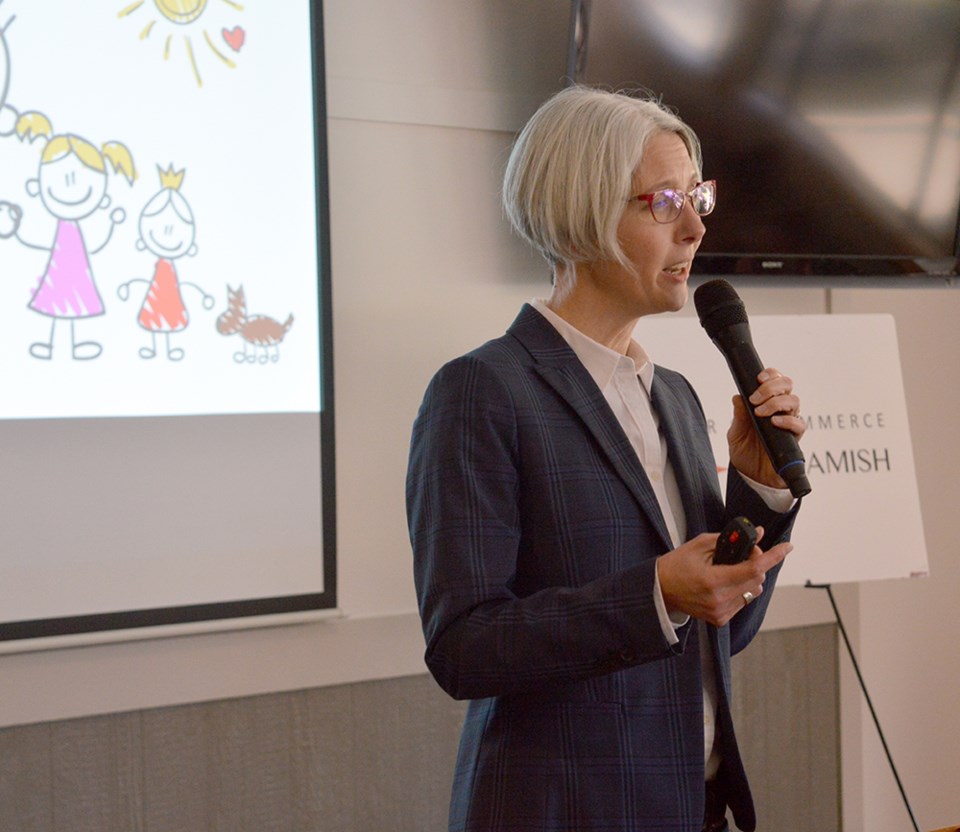In order to help alleviate the housing crisis, Mayor Karen Elliott, speaking on behalf of council, made a big promise to help address affordability issues during the annual mayor's lunch.
"We want to ensure that we increase the number of affordable rental units, so our goal by 2022 is to have 125 new units built," said Elliott. "Not in the pipeline — built."
These accommodations would cost 80 per cent of the market rental rate or lower.
It was one piece of council's new strategic plan, which heralds the goals of the newly-elected politicians regarding affordable housing, environment and the economy, among other things.
The document was unveiled by Elliott to the Chamber of Commerce on Jan. 23 at the Squamish Valley Golf & Country Club.
The strategic plan also promises to create a housing governance structure this year, though details on what that will look like haven't been hashed out yet. It won't necessarily be a replica of Whistler's housing authority, Elliott said.
Council is also making it a priority to identify land that can be used for more affordable housing. Efforts will also be made to increase the types of affordable housing, as well as provide affordable homeownership options.
She noted that affordability is closely linked to the local economy, as well as building a sense of community in town.
If people can't afford to live here, businesses will suffer from a lack of labour, she said. Should local businesses suffer, it will force people to commute to the city for work.
The town loses a lot of community engagement if it can't support local jobs. For example, Elliott said, a great deal of time that people could spend volunteering gets lost simply because residents spend three hours a day commuting in their cars.
During the talk, Elliott was also vocal in her support of making Squamish an environmentally-friendly town.
"It is time to act," she said. "We know from the latest [Intergovernmental Panel on Climate Change]report that we need to cut carbon pollution by 45 per cent by 2030 — that's 11 years. And It's time for all communities to start to get serious about that."
She was referring to a recent UN report that predicted catastrophic climate change will occur should greenhouse gas emissions continue unchecked.
Elliott said this upcoming budget, she hopes to include a new staffer who would lead the way as far as developing an environmental plan for Squamish.
Staff estimate this one-year position would cost about $47,000, though this number is just a preliminary figure subject to change.
Some of the environmental goals in the strategic plan include the creation of greenhouse gas emission reduction targets; reducing per capita landfill waste to 300 kilograms by 2021; maintaining carbon neutral operations in municipal government and reducing the amount of the workforce commuting in single-occupancy vehicles, among other things.
The District website says that in 2016, residents sent 676 kilograms of waste per person to the landfill.
After Elliott's speech, there was a question period, during which a former councillor made an appearance.
Susan Chapelle, who lost the mayoral race to Elliott in October, asked if and when council would create an accessibility committee that would help direct council with making the town's facilities more friendly to people with disabilities.
"It was promised last term," said Chapelle. "I'm just wondering if this council has thought about an accessibility committee."
Elliott replied council hasn't made a decision yet on its committees, as it was focused on the strategic plan.
She said it would be the next step.
Accessibility issues were also a talking point for Elliott during the last mayoral candidate debate, just before the most recent election.
She advocated for public facilities that could work for "eight and 80-year-olds."




